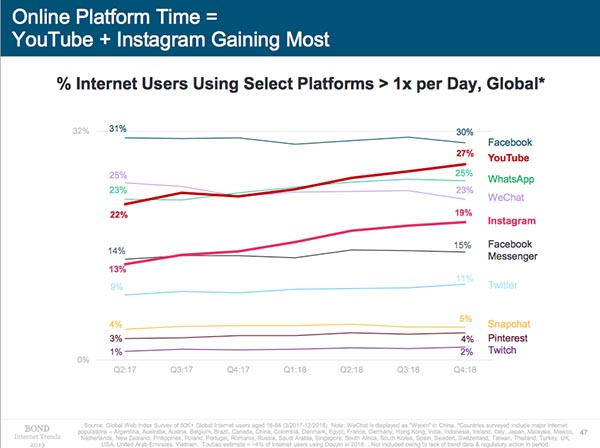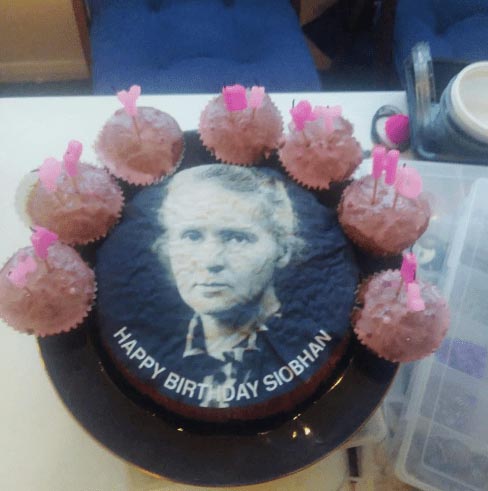Mary Meeker Slide Roulette—Spin #2
Last week saw the release of the latest edition of the annually anticipated Internet Trends Report from Mary Meeker. For the next few weeks, we will continue to play Mary Meeker Slide Roulette, in which we randomly pick a slide out of the 333 in the deck.
Round and round she goes… Our second spin lands on Slide 48: “Online Platform Time”:

We’re guessing some people in Pakistan will be decreasing their time spent on Facebook Live...
Hello, Kitty
It wasn’t MAKA, but a popular story this week involved in ill-fated press briefing given by Pakistani minister Shaukat Yousafzai. It was streamed on Facebook Live, but, for reasons passing understanding, an augmented reality (AR) kitten filter was left on, which left Yousafzai briefing the media whilst festooned with pink ears, rouge, and whiskers. Yousafzai was not the only one kitten-ified. The stream was deleted immediately after the event, but the Internet never forgets.
What have this official PTI KPK Facebok page has done with KPK Information Minister Shaukat Yousafzai ?? !
— Mohsin Bilal Khan (@MohsinBilalKhan) June 14, 2019
This is INSANE. @SAYousafzaiPTI pic.twitter.com/bttJt5FrdB
Pandamonium
China has successfully developed a facial recognition app for pandas.
— Quite Interesting (@qikipedia) June 20, 2019
Fit to Be Tried
ShareCloth makes 3D editor for fashion available FREE: the Editor, a tool to generate apparel 3D samples for digital product development and production, is part of the ShareCloth initiative to help digitize fashion. It generates 3D samples from the flat digital pattern, and it has a body generator to create client’s digital avatars, based on 15+ measurements, for precise virtual fitting. Check it out here.
“Sgt., Put a Tail On Him”
Here’s a fashion accessory we hope catches on. If only it were prehensile.
If so inclined, you can now buy an app-controlled animatronic tail. (h/t @dgquarterly image https://t.co/4Vxc40ywiK) pic.twitter.com/i9Rfzj42gg
— Quite Interesting (@qikipedia) June 19, 2019
Just Your BASIC Historical Marker
One of the major milestones in computer history was the invention of the BASIC computer language, which took place at Dartmouth College in Hanover, N.H., in 1964. And now, what is believed to be the first historical market commemorating computer history has been installed on Route 120 just near the Hanover town line. From the Concord (N.H.) Monitor: “the 255 official historical markers placed alongside state roads told us enough about covered bridges and birthplaces of famous people but not enough about geekiness.” Beginner’s All-purpose Symbolic Instruction Code (BASIC) was the first computer language designed for newbies, and was instrumental in triggering the computer revolution that began in the 1960s and 70s—and is still continuing.

Geoff Hansen / Valley News
Throw in the Towel
A paper towel dispenser with an end-user license agreement is a special kind of hell https://t.co/zte4pBEiBE pic.twitter.com/8BVMK152TV
— The Verge (@verge) June 20, 2019
No Fishing
If you live in the Northeast, you may have seen a new sight on city streets: a redesigned postal mailbox, intended to reduce postbox “fishing,” which—surprisingly, given the decline in mail volume—has been on the rise.
Thieves, often at night, use string to lower glue-covered rodent traps or bottles coated with an adhesive down the chute of a sidewalk mailbox. This bait attaches to the envelopes inside, and the fish in this case — mail containing gift cards, money orders or checks, which can be altered with chemicals and cashed — are reeled out slowly.
So the USPS has introduced a new mail box that does away with the hinged door and replaces it with a narrow slot with a slatted barrier behind it. It prevents anything thicker than letters—like padded mailers—to fit, necessitating a trip to the Post Office if you need to mail those kinds of items.
When Indexers Attack
Huzzah!
No joke - in the 16th edition of Williams Obstetrics
— Pietro Bortoletto, MD (@BortolettoMD) June 17, 2019
“Chauvinism, male, voluminous amounts pg 1 - 1102”
Bravo to the female copy editor who snuck this one in ?? #true
Cc: @DrJenGunter pic.twitter.com/Cfdbv9VXBh
Shandy Town
Laurence Sterne may not be a household name, but he is the author of perhaps one of the best comic novels ever written. The BBC pays tribute to Sterne’s Tristram Shandy, or to give it is full title, The Life and Opinions of Tristram Shandy, Gentleman, published in nine volumes in the mid-18th century. It was an unlikely bestseller.
Tristram Shandy had such success because it was a sensational book: not just a good yarn, but wildly experimental. It messed about with the novelistic conventions of the time, such as linearity and a structured plot, and took innovations like the self-conscious narrator to an extreme. “And Sterne integrates those things with this extraordinary narrative of these funny dysfunctional characters living out their fractured lives,” says Hawley.
The book was not without its bawdiness (the titular character has an improbable bris effected by a falling window, amongst other naughty bits), which accounted for no small part of its appeal, but Sterne also utilized a smattering of visual elements in the book. As a result, Sterne was probably One of Those Print Customers:
If the tone of the book was whimsical, Sterne was absolutely serious about its physical production. His surviving letters to publishers are exacting in their demands about paper quality, print type and lay out, and he would supervise the printing of each volume. That’s because they involved some very particular visual elements, including three famous disruptions to the text.
These included two entirely black pages following the death of Parson Yorick. In volume three, there is one page that is entirely marbled—and at the time, each copy of the book had the marbling done by hand (think of it as 18th-century variable printing). It was such a such a wacky idea that there are fans of the book who even celebrate the publication of that page.
The book is wildly experimental, and while one might be inclined to say that Sterne broke the conventions of novel writing, the fact was that, in the 18th century, the novel was, well, novel, and there really weren’t all that many conventions to break. In fact, it took a century or so for the novel to be taken seriously as a form of literature (poetry, drama, and essays were the belle-est of belles-lettres). Then came Dan Brown to knock it back down again. Oh, but we kid....
It may not be ideal beach reading, but we highly recommend it. Michael Winterbottom also attempted a film adaptation called Tristram Shandy: A Cock and Bull Story (2005) starring the incomparable Steve Coogan and Rob Brydon.
The Elements!
Sometimes we’re easily amused.
Enthusiastic chemistry teachers be like pic.twitter.com/BqcfKjjgW8
— Dr. Jens Foell (@fMRI_guy) June 16, 2019
No Cakewalk
Everyone who works in publishing inevitably experiences the occupational hazard of inadvertently running the wrong image. But bakeries? Boing Boing tells of a bakery printing mishap in which a woman wanted her birthday cake to feature a photo of Mariah Carey—you know, the singer—but instead she got Marie Curie—you know, the physicist. Still, it does look very festive.

They could have gone one further and had the cake glow in the dark.
I Think I’m a Clone Now
(Optional musical accompaniment to this item.)
Some of us were fans of the BBC America science-fiction show Orphan Black, a five-season series about genetic cloning which featured more than a half-dozen bravura performances by the (finally!) Emmy-winning Tatania Maslany. The show ended in 2017, but, via The Verge, it is being resurrected this summer on a unique publishing platform developed by Serial Box:
it releases novel-length seasons of a story, broken up into a series of episodes. It’s a format that adheres more to that of a TV show, rather than your traditional novel. Over the last couple of years, the publisher has released a number of its own original content with titles like Ninth Step Station, The Vela, and The Witch Who Came in From The Cold. This year, Serial Box made the jump into licensed IP with a slate of stories set in the Marvel universe featuring Black Panther, Black Widow, Jessica Jones, and Thor.
Orphan Black: The Next Chapter is set eight years after the events of the TV series, will feature the same characters, and will be narrated by Maslany.
I Think I’m a Clone Now
(Optional musical accompaniment to this item.)
Some of us were fans of the BBC America science-fiction show Orphan Black, a five-season series about genetic cloning which featured more than a half-dozen bravura performances by the (finally!) Emmy-winning Tatania Maslany. The show ended in 2017, but, via The Verge, it is being resurrected this summer on a unique publishing platform developed by Serial Box:
it releases novel-length seasons of a story, broken up into a series of episodes. It’s a format that adheres more to that of a TV show, rather than your traditional novel. Over the last couple of years, the publisher has released a number of its own original content with titles like Ninth Step Station, The Vela, and The Witch Who Came in From The Cold. This year, Serial Box made the jump into licensed IP with a slate of stories set in the Marvel universe featuring Black Panther, Black Widow, Jessica Jones, and Thor.
Orphan Black: The Next Chapter is set eight years after the events of the TV series, will feature the same characters, and will be narrated by Maslany.
She’ll Thank Him Later
Cool Dad Raising Daughter On Media That Will Put Her Entirely Out Of Touch With Her Generation https://t.co/8AHx4RYbOy pic.twitter.com/Z2rUiqnrRq
— The Onion (@TheOnion) June 17, 2019
Let There Be Wi-Fi
Or, to be more precise, Li-Fi. Signify, which is apparently what Philips Lighting is now known as, is introducing Truelifi, a range of Internet-transmitting Li-Fi lights. (Yes, lights can transmit Internet signals.) Writes The Verge: “They’re capable of transmitting data to devices like laptops at speeds of up to 150 Mbps using light waves, rather than the radio signals used by 4G or Wi-Fi. The product range will consist of both new lights as well as transceivers that can be retrofitted into existing lighting. The technology can also be used to wirelessly connect two fixed points with data speeds of up to 250 Mbps.”
Li-Fi is apparently not a new thing but never really, er, turned anyone on. It has certain advantages over radio-frequency WiFi, such as the ability to be used in areas where there might be a lot of radio interference, or in places like hospitals where they can interfere with equipment that is trying to save someone’s life. It also has security advantages in that it is easier to block Li-Fi as well as control where it physically goes.
Interesting idea—but then we also thought broadband over power lines (BPL) was a cool idea, too.
We Bring Good Things to Life...Eventually
“The more they overtake the plumbing, the easier it is stop up the drain.” —Commander Montgomery Scott
Remember when changing a light bulb was a fairly simple process? Those were the days.
How many seconds does it take a reset a GE lightbulb? This is insane enough to be joyous.
— Stephen Fry (@stephenfry) June 20, 2019
https://t.co/fHCjxkMBlQ
Stick to Your Knitting
Especially if it is crocheted body parts.

“Hi, Grandma, what are you— Oh my God!!!”
This Week in Printing, Publishing, and Media History
June 17
1882: Russian pianist, composer, and conductor Igor Stravinsky born.
1898: Dutch illustrator M. C. Escher born.
1901: The College Board introduces its first standardized test, the forerunner to the SAT.
June 18
1854: American publisher and founder of the E. W. Scripps Company E. W. Scripps born.
1858: Charles Darwin receives a paper from Alfred Russel Wallace that draws eerily identical conclusions about evolution as Darwin had been developing. Darwin thus races to publish his own conclusions.
1942: Paul McCartney born.
1948: Columbia Records introduces the long-playing (LP) record, which, curiously, is seeing a bit of a renaissance today as a medium for delivering music.
June 19
1623: French mathematician and physicist Blaise Pascal born.
1846: The first officially recorded, organized baseball game is played under Alexander Cartwright’s rules on Hoboken, N.J.’s Elysian Fields with the New York Base Ball Club defeating the Knickerbockers 23–1.
1897: American comedian Moe Howard born.
1934: The Communications Act of 1934 establishes the Federal Communications Commission (FCC).
1947: Indian-English novelist and essayist Salman Rushdie born.
1948: English singer-songwriter Nick Drake born.
1978: Garfield, holder of the Guinness World Record for the world’s most widely syndicated comic strip, makes its debut.
2018: The 10,000,000th United States Patent is issued (“Coherent Ladar Using Intra-Pixel Quadrature Detection,” assigned to Raytheon Company).
June 20
1840: Samuel Morse receives the patent for the telegraph, which becomes the dominant communication method. Until...
...1877: Alexander Graham Bell installs the world’s first commercial telephone service in Hamilton, Ontario.
1928: American saxophonist, flute player, and composer Eric Dolphy born.
[year withheld]: Frank Romano born. Shortly thereafter, was visited by three “iMagi” bearing gold from Gutenberg’s goldsmith shop, a line of type from Ottmar Myrrh-genthaler, and he’ll be Frank-incensed if he reads this.
1975: The film Jaws is released in the United States, becoming the highest-grossing film of that time and starting the trend of films known as “summer blockbusters.”
2003: The Wikimedia Foundation is founded. The Wikimedia Foundation is a nonprofit charitable organization dedicated to encouraging the growth, development, and distribution of free, multilingual, educational content, and to providing the full content of these wiki-based projects to the public free of charge. Most notably, it operates Wikipedia.
June 21
1903: American caricaturist, painter and illustrator Al Hirschfeld is born.
1905: French philosopher and author Jean-Paul Sartre born.
1944: English singer-songwriter and guitarist Ray Davies born.
1957: American author, illustrator, and creator of the Bloom County comic strip Berkeley Breathed born.
1973: WTF: the Supreme Court hands down the decision in Miller v. California 413 US 15, establishing the Miller test for obscenity in U.S. law.
1978: The original production of Tim Rice and Andrew Lloyd Webber’s musical Evita, based on the life of Eva Perón, opens at the Prince Edward Theatre, London.
June 22
1906: Austrian-born American director, producer, and screenwriter Billy Wilder born.
1969: The Cuyahoga River catches fire in Cleveland, Ohio, drawing national attention to water pollution, and spurring the passing of the Clean Water Act and the creation of the Environmental Protection Agency.
June 23
1860: The United States Congress establishes the Government Printing Office.
1868: Christopher Latham Sholes receives a patent for the "Type-Writer."
1912: English mathematician and computer scientist Alan Turing is born.
1926: The College Board administers the first SAT exam.
1969: IBM announces that it will start pricing its software and services separately from hardware—thus creating the modern software industry.
1991: Sonic the Hedgehog is released to American audiences, then to PAL and Japanese audiences a month later, kickstarting the successful Sonic franchise.














